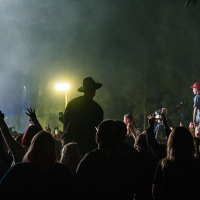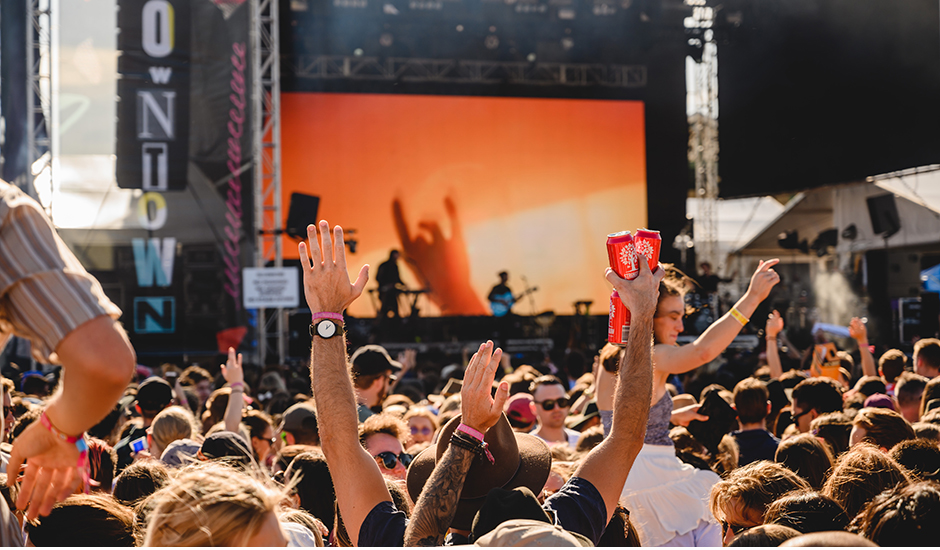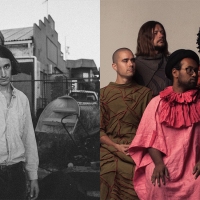 Spacey Jane, The Waifs, Alter Boy + more: Meet your free SOTA Rewired 2021 line-upThe entirely free festival returns to its Burswood Park home this WA Day, June 7th.
Spacey Jane, The Waifs, Alter Boy + more: Meet your free SOTA Rewired 2021 line-upThe entirely free festival returns to its Burswood Park home this WA Day, June 7th.

Live music can’t survive in a vaccine-less Australia
Today, yet another music festival is forced to cancel, placing more employees and vendors at risk. It can’t go on.
Header image by Liam Fawell.
In January, Scott Morrison claimed that Australia aims to have four million doses of the coronavirus vaccine administered by March 31st. That’s two million people - the entire population of Perth, for example - vaccinated against coronavirus three months into the year. In late January, Health Minister Greg Hunt anticipated that by Halloween, almost the entire Australian adult population would be vaccinated - approximately 20 million people.
With that goal, the Australian live music industry began to plan. Many live music stages were already open as the year turned into 2021, but were in constant threat of lockdown; they were - always - the first thing to shut, and the last thing to open once a case had been detected in the community. By October, though - with a population fully vaccinated - it seemed like the end of the tunnel, and everything from club shows to multi-day festivals were eyeing a comeback.
Some festivals leapt straight into things. Bluesfest pressed forward for an April commencement, betting that the Byron region’s absence of coronavirus scares thus far would carry through a few extra months (they were wrong). Groovin the Moo launched their new Fresh Produce venture, a boutique take of the touring festival visiting more markets in the Spring, where according to calculations, at least 75% of the country would be vaccinated (if trends continue, they were wrong too). Events moved forward, assuming that by spring, the threat of coronavirus would be completely eradicated, and full-capacity shows could run with no risk.
At the time of writing, we’re a couple of days off from entering June, and the four million dose mark is within eyesight - two months behind schedule. According to The Guardian, if the current vaccination rate continues, the 40 million doses needed to vaccinate the adult population won’t be reached by Spring 2021. It will be reached by Spring 2022 - September, to be exact.
That means, that until September 2022, every single live music event in Australia will be at risk of sudden shut-down and that the red tape hoops they have to leap through currently will remain for an entire year to come - and then some.
For some industries, that’s a risk willing to bet on - people can work from home, business runs as usual - but for live music, it means nothing happens. Bar staff can’t work from home (no, making their housemates cocktails doesn’t count). Lighting and sound engineers can’t work from home. Tour managers can’t work from home, nor can the artist managers, booking agents, publicists, venue managers, venue bookers, not even the artist themselves. If live music has to shut down - even for just a week - then every single bit of hard work goes out the window, and the return is nothing. Yet, bills still need to be paid, and rent is still due.
Without JobKeeper, the Australian live music industry is walking on a tightrope, and every time a lockdown happens and venues are shut, that tightrope swings, and every single person involved falls flat on their ass. It happens again, and again, and again. It happened in Adelaide, in Sydney, in Brisbane, in Perth (twice), and now again in Melbourne. In each of these instances, every single person even remotely involved with live music has to drop everything, scramble to reschedule shows and type up announcements and call insurance, knowing that this week, their wallet is going to be a little tighter. That’s no way to live, and yet for the live music industry, it’s been the norm since things began to re-open last year, and will continue to be until vaccinations are administered around the country.
Nina Las Vegas - someone who has been dealt the cancellation card plenty of times, whether it be her own shows or for artists she represents - is one of the many artists that have had enough. “Australia should be re-opened by now, vaccinated and rebuilding our careers,” she typed on Instagram. “How are only 1.6% of the population fully vaxxed, in a country that currently has an outbreak from a hotel quarantine breach?”
View this post on Instagram
She isn’t the only one fed up, either. The comment section of that post is deep with artists expressing their frustration, and the same is on any other post about Australia’s touring music industry. In the last few months alone, I’ve seen so many people leave what seem to be incredible jobs for work beyond the music industry, in industries where their jobs are not constantly at risk from being shut down by a single case, and left in limbo for weeks thereafter.
It makes it even harder too, watching how the government is continuing to ignore the creative and entertainment sectors in every single way they attempt to combat this virus. When a single case emerges, sports events remain - the MCG, for example, was to remain open, despite a case even being dedicated within its walls (now that Melbourne is going into full lockdown, however, that is obviously no longer the case). Nightclubs and music venues are always amongst the first shut, and they’re always the last to find normalcy too. When they can open after an outbreak, it’s at half-capacity, where everyone has to sit down and nobody is allowed to dance nor sing. What’s the point?
It’s frustrating watching the government act as if measures like JobKeeper aren’t needed, when there are so many people still facing unemployment, or having their income stripped away the second venues shut. “Wah wah, those poor artists,” people laugh, but it’s a fucking huge industry - with more people than you think.
Today, for example, Fresh Produce - the Groovin the Moo venture earlier mentioned - announced they would not be going ahead this year, unable to risk being cancelled last-minute despite being planned for a period where the majority of the population was meant to be vaccinated, according to government reports. The artists miss out on their income, sure, but so does the dozens-strong collection of brilliant people that run it - from publicists to ticketing agents to bookers to general managers and so on. Every food truck relying on the festival as a source of income this spring is affected. Every regional community has its potential tourism income dashed. Even Pilerats is affected; our advertising partnership with the festival in jeopardy because they can’t rely on a coronavirus-free Australia by the time the festival comes around, even though the government said it would be.
“Live music is back!” is a sentence that rings out whenever a music event manages to sneak through unharmed, and there’s definitely progress being made. Internationally, Australia was once a place to be jealous of - people can dance in nightclubs (sometimes) and packed crowds singing along to everything from Tame Impala to Lady Gaga have made headlines internationally. But now, countries that were far worse in crisis during coronavirus’ peak are eyeing comebacks, and they’re seeming more real than our own, considering vaccination rates and the work governments have put in alongside the creative industry to get things where they need to be.
“Live music is back!” insinuates that things are back to how things were in a care-free 2019, as Australian music was entering yet another golden period and festivals were thriving. We’re nowhere near that, and we won’t be for as long as the government continues to laugh in our face with the country’s vaccine roll-out.
 Spacey Jane, The Waifs, Alter Boy + more: Meet your free SOTA Rewired 2021 line-upThe entirely free festival returns to its Burswood Park home this WA Day, June 7th.
Spacey Jane, The Waifs, Alter Boy + more: Meet your free SOTA Rewired 2021 line-upThe entirely free festival returns to its Burswood Park home this WA Day, June 7th.
 WA Pals: Grievous Bodily Calm and Jack Davies have been added to SOTA RewiredThe pair of West Australian favourites join Spacey Jane, Alter Boy and more at the FREE (!) event on June 7th.
WA Pals: Grievous Bodily Calm and Jack Davies have been added to SOTA RewiredThe pair of West Australian favourites join Spacey Jane, Alter Boy and more at the FREE (!) event on June 7th.